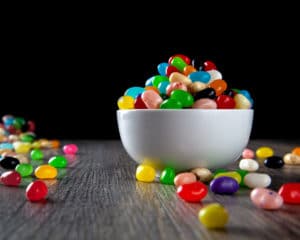Hold Up… Jelly Beans Have Sugar?
People today tend to like to know what they are putting into their bodies when they reach for a snack or have a meal. For example, many people are looking to find ways to cut sugar out of their diet. However, this can still cause a bit of confusion amongst some people who may not know all of the terms used for sugar.
In 2017 in San Bernardino County, California, Jessica Gomez filed a federal class-action lawsuit against the Jelly Belly Candy Co. She claimed that she was fooled into buying jelly beans from the company. She says that she believed she was buying “sports beans” instead.
Gomez sued, saying that they mislabeled sugar on the list of ingredients. She wanted damages, restitution, and wanted a court order that would prevent Jelly Belly from continuing to engage in what she thought were fraudulent practices.
What Are Sports Beans?
To be fair, Jelly Belly does offer a product called Sports Beans to athletes as a way to get some quick energy. They are supposed to help with sports performance. They have vitamins, carbohydrates, and electrolytes. She bought these thinking they were a healthy alternative and a way to get more energy.
The product lists evaporated cane juice on their ingredient list, but they don’t say sugar. The suit claims that they do this to make the product appear healthier and not like candy. Gomez’s lawsuit claims that this deceives customers into not knowing what is truly in the products they are buying.
According to the lawsuit, she would not have bought and eaten the Sports Beans if they had been properly labeled as containing sugar.
So, what is evaporated cane juice? In 2016, the US FDA found that more and more products were starting to use this terminology. They wanted to clarify the meaning for manufacturers. They declared that evaporated cane juice is essentially just sugar.
The FDA has said that sweeteners should not be declared as evaporated cane juice because it is not an entirely accurate term and that it could be misleading.
Response from Jelly Belly
Jelly Belly requested that the lawsuit be dismissed. The attorneys for the candy company said that the claims Gomez was making were not believable. They said that she never indicates where or when she purchased the products, or if she even ate one of the beans. In addition, they said that she did not explain why the ingredient mattered to her or if she was looking for a sugar-free product.
They claim that no reasonable consumer would have been deceived by the labeling, as she couldn’t have seen the ingredient list with evaporated cane juice without also seeing the nutrition label with the sugar content included.
The company also said that they were not trying to deceive anyone with their labeling. Located right on the package on the nutrition guidelines mentioned above, it says that there are 17 grams of sugar in the product.
It doesn’t appear that there’s any deception, only that Gomez didn’t look close enough at the package.
What Happened with the Case
The court hearing for the case was canceled when a federal judge decided to throw out the lawsuit. However, the judge did say that it may be possible for the plaintiff to amend the lawsuit. The reason for the ruling was that Gomez only provided a “cursory, formulaic recitation” of facts. He said there were no factual allegations around the circumstances of the purchase of the product, how she was going to use it, whether she expected a sugar-free product, or what she thought evaporated cane juice was compared to sugar.

